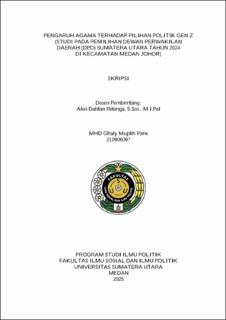Pengaruh Agama terhadap Pilihan Politik Gen Z (Studi Kasus: Pemilihan Dewan Perwakilan Daerah (DPD) Sumatera Utara Tahun 2024 di Kecamatan Medan Johor
THE INFLUENCE OF RELIGION ON THE POLITICAL PREFERENCES OF GENERATION Z: A CASE STUDY OF THE 2024 REGIONAL REPRESENTATIVES COUNCIL (SENATE) ELECTION IN MEDAN JOHOR DISTRICT

Date
2025Author
Pane, MHD Ghaly Muplih
Advisor(s)
Ritonga, Alwi Dahlan
Metadata
Show full item recordAbstract
Indonesia is a democratic country rich in cultural, ethnic, and religious diversity. In the context of electoral democracy, religious identity often plays a vital role in shaping political preferences. This becomes even more significant when related to Generation Z, a youth demographic increasingly active in political participation, especially in the 2024 general election. In Medan Johor District, the noticeable religious diversity and the large number of young voters provide a compelling context to examine the extent to which religion influences Gen Z's political choices, particularly in the selection of Regional Representative Council (DPD) candidates in North Sumatra. This study aims to analyze the impact of religion on Generation Z’s political preferences within the 2024 DPD election in Medan Johor. Employing a quantitative approach and survey method, data were collected through questionnaires distributed to 100 respondents who met the sample criteria. The data were analyzed using simple linear regression to measure the relationship between religion (independent variable) and political choice (dependent variable). The findings reveal that religion significantly affects Gen Z’s political preferences, contributing 60.5% to the variance in voting behavior. Dimensions of religiosity, such as belief in religious teachings, religious practices, and the influence of religious values in social life, were found to significantly shape voters’ tendency to support candidates aligned with their religious values. Religious identity emerges as a key determinant in the voting behavior of Generation Z. These findings are crucial for electoral bodies and DPD candidates in designing more inclusive political strategies and enhancing civic education that encourages young voters to make decisions based on competence rather than solely on identity.
Collections
- Undergraduate Theses [1123]
